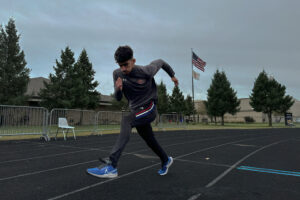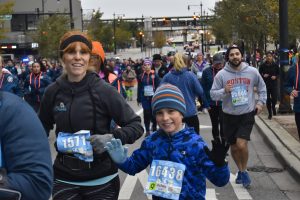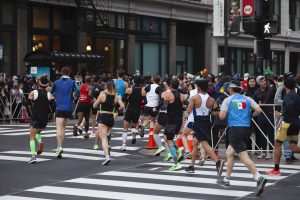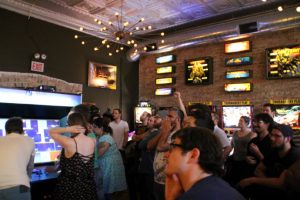The smell of rubber wafts up from the basketball court inside the gymnasium. Silence reigns until Dan Krell, No. 9, yells “Nice wheels” to his teammate Joe Gerardi, No. 4.

The wheels that he’s referring to are not affiliated with a new automobile, because Gerardi has cerebral palsy and he is in a wheelchair.
Krell and Gerardi play for “The Chicago Bears,” a wheelchair rugby team sponsored by the Rehabilitation Institute of Chicago (RIC). Although there is only one team in the state, there are 54 total in the league.
The season is over but practice isn’t, as eight team members, six with different degrees of spinal cord injuries, gather inside the Northeast DuPage Special Recreation Association (NEDSRA) in Addison, Ill., bright and early on a weekend morning.
Wheelchair rugby has often been described as a combination of football, hockey and basketball in a wheelchair. The game starts with four players per team on a basketball court. Any individual with impairments in three or more extremities may be eligible to play.
Another requirement? Don’t be intimidated by the profanity and honesty that comes out of these player’s mouths.
Rob Spinks, No. 6, is an adult who has been confined to a wheelchair for only 6 years of his life since he got shot in 1999, but he doesn’t let it frustrate him.
“He’s caught on YouTube saying, ‘I’m just happy to be alive. Every day I wake up and I’m just happy to be alive,’” says teammate Dan Sauber, No. 5.
Spinks responds, “Dude, when somebody tries to murder you man, you have a different perspective on life.”
When the team was asked the general question, “Does anyone here compete in the Special Olympics,” Sauber shouts. “We’re not special, we’re Para!”
This is a reference to the words “parallel” and “Olympic,” to illustrate how the two movements exist side by side.
The room is filled with battery powered chairs and manual wheelchairs.
Before practice begins, the gentleman prep them by making sure air is in the tires and that their hands are gloved and taped.
Coaches Mike Klonowski, a physical therapist at RIC, and Kara DiVincenzo, an occupational therapist at RIC, help the gentlemen wrap their hands.
When they’re done getting geared up, Tommy Elling, No. 15, rolls as fast as he can into Sean Kent, No.13 and a loud boom of metal colliding echoes off the walls.
Players use custom-made sports wheelchairs that are specifically designed for wheelchair rugby.
Chair-design features might include: pickbars mounted to the front that are designed to strike and in some cases hold opposing wheelchairs and wings positioned in front of the main wheels to make the wheelchair more difficult to stop and hold.
All wheelchairs must be equipped with spoke protectors to prevent damage to the wheels, and an anti-tip device at the back.
Klonowski has been with the team for the last year-and-a-half and is brutally honest about his rugby knowledge.
“I don’t know s–t about quad rugby, but I’m learning. I’ve always wanted to work with a quad rugby team, because I worked with a team near Columbus, OH. and I loved those guys.”
After catching wind of the Chicago team, Klonowski decided to collaborate. It takes a lot of dedication to do something like this because practices are in Addison and he doesn’t have a car.
“I use an RIC vehicle because I drive players out here. I pick up Cody Denney, No. 3 and I pick up new recruits to bring them out here and expose them to it.”
Klonowski provides tough love as he tells each player to line up along the sideline for laps around the gym.
Once lap practice is over he announces, “Bring it in” for some wrist exercises and arm rotations.
From the bleachers, the smile on everyone’s face is clear; they are having a good time. The friendship is high as laughter fills the space, as they tell each other jokes and stories.
Once the laughter stops, it’s time for drills.
Klonowski has all eight teammates line up on the sidelines as he tells them to wheel about 10-feet across the court and spin around, first left, then right.
The anguish on Elling’s face is visible as he tries to pick up speed.
“A lot of upper-body strength is required for this sport,” says Denney.
DiVincenzo mentions that these players can’t sweat below the level of injury. That’s the reason for so many water breaks.
“They have to be sprayed with water in order for it to evaporate so that they can cool off,” says DiVincenzo.
As we move outside to the park where it is cooler, DiVincenzo and Klonowski don’t call themselves mentors to these rugby players.
“They are more like mentors to us because of their lifestyle,” says Klonowski.
He explains that when these guys are being active by playing a sport they love, smiles are seen all around, but once they go home, stuff hits the fan because everything is different.
That being said, it is time for all eight males to overcome a challenge of rolling the distance of a mile around a bumpy concrete trail.
Denney mimics the ‘little engine that could’ as he was the last to follow behind his fellow players. He has only been with the team since the winter of 2012 and his new friends already have memories to share.
Sauber starts telling a tale about a traveling game they had last season.
“Cody’s mom was traveling with him and she left her bag on the floor and he wanted to go someplace else. So he’s struggling to pick it up and he couldn’t get it on his lap. The whole place is staring at him and after he finally got it on his lap he got a standing ovation,” says Sauber.
After reminiscing everyone rolls back into the gym where practice continues. Klonowski blows the whistle and tosses a volleyball to Sauber as all of the guys hustle into the center of the gym. Spinks crashes into Sauber so hard that the sound of a tire deflating is heard.
Sauber pulls over to the sideline for a tire change. It only takes a minute before he rolls back into the game and pushes up speed to play offense.
Sauber serves the ball with his right hand and sends it over to Kent.
Whichever player has the ball is surrounded by teammates in their chairs, who try to knock it out of their hands.
Sauber slides into Gerardi and the sound of metal slamming together is heard once more.
Rugby is an aggressive sport, even when played in a wheelchair. In fact it’s so dangerous; it’s earned the nickname “murder ball.”
The words “no contact” are being shouted often.
Sauber gets hit so hard, that his chair flips over. Sometimes during games, coaches will need to slide a board under the chair to pick it back up, but this rarely causes injury to players.
He sustains no injury and carries on, however the whistle is blown because practice is over.
So what’s next for The Chicago Bears Wheelchair Rugby Team?
Since the gym isn’t air-conditioned, the team only practices up until early May then the season resumes in the fall.
The Chicago Bears Wheelchair Rugby team travels more than the football team. They only have about two local games and then aren’t around until January 2014.
The sound of tape being stripped gets louder and hands are visibly bruised. But it’s all worth it to these guys just to get out of the house for the day.
It is 1 o’clock in the afternoon and the players have the rest of the day for themselves.
Spinks tells Denney he’ll call him during the week as the rest of the guys wish each other a good day.
“I usually veg out, go home and watch T.V.,” says Denney.








Be First to Comment